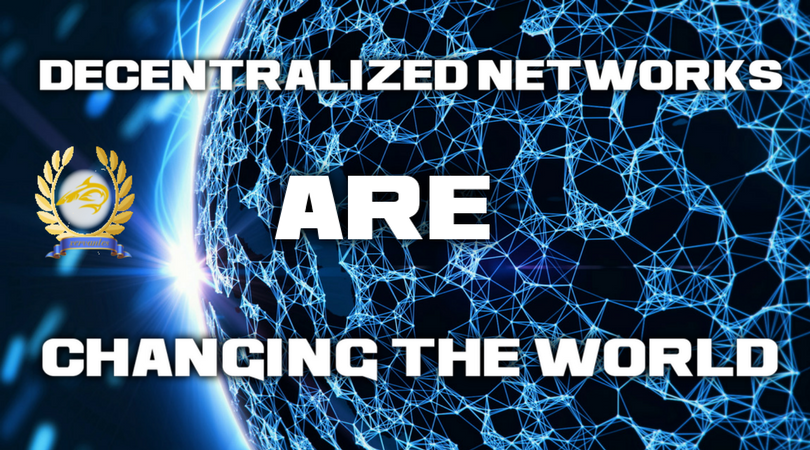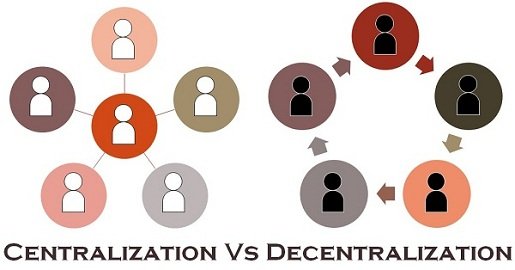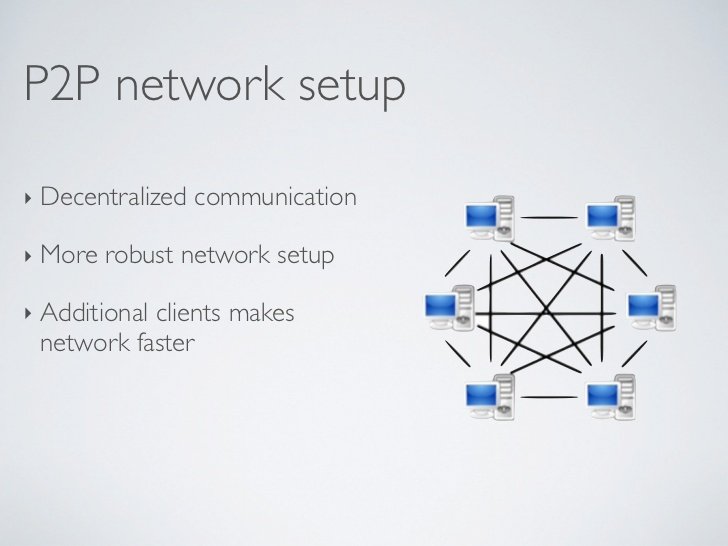The information age has brought with it many changes to society. One significant change is the way we handle digital data. With the digital revolution it has become very easy to copy and share digital files. This is beneficial for consumers but creates a problem for organisations who want to maintain control over digital content that they consider to be their intellectual property.

What is it?
Decentralized networks are clusters of different servers or computers that are remotely connected. In this case we are focusing on networks where files (data) is shared by the different servers/computers (nodes) who have different independent owners or hosts.
Decentralized computing is the allocation of resources, both hardware and software, to each individual workstation, or office location (source Wikipedia)


History
Perhaps the best example of decentralized networks are P2P networks. They provide a platform for users to share digital files outside the traditional distribution networks.
The size of music files makes it difficult to share on a large scale. With the introduction of MP3 compression in 1992 it suddenly became possible to shrink large music files into smaller files with am acceptable loss of quality. The combination compressed music files and P2P networks started a revolution, on a large scale people started sharing music over P2P networks.
Most of the shared files are property of the music industry and record sales started declining almost immediately.
A couple of counter measures were put into effect to battle the global piracy.
Proprietary compression
Companies like Sony and Microsoft developed their own standards as an alternative to the MP3. Microsoft developed WMA as a standard and Sony tried to shove ATRAC down our throats. Both these forms of compression came with digital security preventing piracy.
Like all attempts to battle the popularity of the MP3, both ATRAC and WMA failed. Not because of technical issues but because the public did not embrace the digital restrictions.Shut down
Like always the Pavlov reaction of authorities to anything unregulated and unwanted on the internet was Shut it down!
Now this is where things get interesting because how exactly can you shut down on a Peer to Peer network (P2P)?
P2P connects users so that they can share files. There is no central hub where the files are stored. Users download and upload the shared content directly from and to each other.
You can imagine the panic within the music Industry and regulators when the realisation sank in that these decentralized networks are next to impossible to shut down.
To stop the distribution of digital files over a P2P network you would have to target the uploaders and downloaders this means you would have to track down and identify hundreds or even thousands of ip-addresses from every place in the world imaginable.
For every P2P program (that was used to connect to a P2P network) targeted another popped up. All the attempts trying to shut down P2P networks resulted in more and improved alternatives.


Reasons why
Why are decentralized solutions like P2P networks or blockchains so popular?
- Control
Companies want to maintain their control over their products/solution. This is understandable but this control also has a limiting effect. It is not possible for the community to actively contribute to the development of the product or service. Most important factor of course is that if a company loses control over their intellectual property, this will result in a loss of revenue.
This is why companies are very close lipped about the design of their products/solutions, in the IT this is called "proprietary", it basically means that no one besides the company that owns the intellectual property understands how it works and is able to modify it.
But with decentralized networks distribution of a product/solution is controlled by the users.
Contribution
With decentralized solutions you get the opportunity to participate. You can become part of the solution and give input. Your ideas and the ideas of others can help lift the platform to a higher level.Stability
The network is not depended on one central organisation or location, it has no impact if a node in the network goes down. Files thaGrowth
Because of the setup of decentralized networks there are no issues with expansion. Simply put the network will grow if another computer or server joins the network.Retention
Once a file is shared on the network it is there as long as the network is active. Because the file is shared on multiple nodes and clients it is almost impossible to delete or "lose".New possibilities
The latest implementation of a decentralized network is to use the network as a public ledger, I am talking about the Blockchain of course.
With the Blockchain we have all the advantages of a decentralized network and the added benefit that cryptocurrencies have a monetary value.
Bitcoins and Ethereum are the most well known cryptocurrencies that can be converted into fiat currency.


The future?
There are several different ways decentralized networks are used, the most common are the blockchains and P2P networks. But what does the future hold?
WIth 3D printers becoming more common, I can imagine that hardware designs are next in line to benefit from a decentralized network. Imagine creating, sharing and improving product designs through a network. We would be able to print our own products based on designs that are now only available if you buy them from companies.
Who knows maybe in the future we might be able to print an iPhone clone.

Conclusion
The development and implementation of decentralized networks can not be stopped. The networks give the users the freedom to implement new ideas and express themselves in ways that are unprecedented. A new shared platform that is accessible for everyone has been created. This platform is free of regulation and the only limits are those of your own imagination.
Traditional companies and regulators will not be very enthusiastic about decentralization because they are not able to control what happens on these networks.
It all comes down to control vs freedom, decentralized networks provide freedom for the users while companies and government want control.
I am of the opinion that in the end "decentralization" will continue to grow into a platform that will shape our future. It will be interesting to see how the industries and authorities will react to these developments.
Initially I suspect that they will try to shut it down only to find that this is an impossible task.
Instead of fighting the inevitable, it will be better to invest in adoption of networks like the blockchain.
Look at the success of Netflix, instead of desperately clinging to old distribution methods, Netflix came up with a new concept and an alternative to illegal downloading and sharing of video files.
Companies and governments should not view decentralized networks as a threat or something unwanted but as a opportunity to usher in a new age.
What do you think, way of the future or not? Let me know in the comment section.


Destiny 2 review for the Lone Wolves
The one about the Rewards
Can you cut off the internet
How to earn Higher Curation Rewards
Litebit Hacked!
New Signature and Award Giveaway
Important Steemit Statistics

